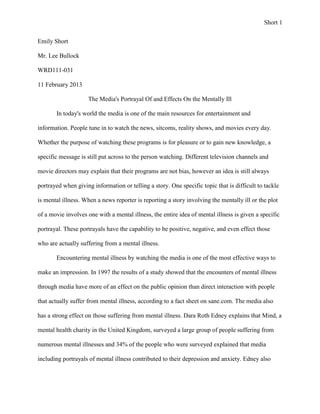
Podcast transcript
- 1. Short 1 Emily Short Mr. Lee Bullock WRD111-031 11 February 2013 The Media's Portrayal Of and Effects On the Mentally Ill In today's world the media is one of the main resources for entertainment and information. People tune in to watch the news, sitcoms, reality shows, and movies every day. Whether the purpose of watching these programs is for pleasure or to gain new knowledge, a specific message is still put across to the person watching. Different television channels and movie directors may explain that their programs are not bias, however an idea is still always portrayed when giving information or telling a story. One specific topic that is difficult to tackle is mental illness. When a news reporter is reporting a story involving the mentally ill or the plot of a movie involves one with a mental illness, the entire idea of mental illness is given a specific portrayal. These portrayals have the capability to be positive, negative, and even effect those who are actually suffering from a mental illness. Encountering mental illness by watching the media is one of the most effective ways to make an impression. In 1997 the results of a study showed that the encounters of mental illness through media have more of an effect on the public opinion than direct interaction with people that actually suffer from mental illness, according to a fact sheet on sane.com. The media also has a strong effect on those suffering from mental illness. Dara Roth Edney explains that Mind, a mental health charity in the United Kingdom, surveyed a large group of people suffering from numerous mental illnesses and 34% of the people who were surveyed explained that media including portrayals of mental illness contributed to their depression and anxiety. Edney also
- 2. Short 2 found, after examining Wahl's studies, that "stigma due to negative media coverage impedes recovery." The media does not only create its own depictions of mental illness, but it also contributes to popular stereotypes. Nowadays it is nearly impossible to escape all stereotypes, and one group of people that seem to always have stereotypes against them are those suffering from mental illness. Margarita Tartakovsky made a list of some stereotypes and three of the most known ones are that people with mental illness are violent, people with mental illness are unpredictable, and people with mental illness do not get better. The recent movie Perks of Being a Wallflower demonstrates the stereotype of people with mental illness being violent. When the main character Charlie, a high school student suffering from extreme depression, sees his friend being threatened he physically attacks the boys who are assaulting him. Afterward he claims that he cannot remember what he did. The television show Family Guy produced an episode when the main character, Peter Griffin, took a standardized test to see if he was a genius and his score identified him as mentally handicapped. For the rest of the episode Peter does things like enter stalls in the women's restrooms and use the excuse "sorry I'm retarded" as if it makes his actions acceptable. In the movie Dear John the main character, John, has a father who is autistic. At first he does not know his father is autistic, but when he realizes he gets angry and feels frustrated that his father will not instantly get better. All of these popular fictional stories in the media contribute to certain stereotypes pertaining to mental illness. Mental illness is something that is difficult for one to sweep under the rug and ignore. Certain illnesses are more severe than others, but all people suffering from mental illness feel the judgment and pressure from society due to the media. Different television shows and movies portray mental illness as something humorous, bothersome, and even scary. This portrayal of
- 3. Short 3 mental illness to the public is taking a toll on those actually suffering from the illnesses. They feel pressure from society to act a certain way, and feel like if they seek help they will be labeled as an outcast. The media targets multiple audiences when presenting its programs, and those suffering from mental illness are not included in any of those audiences.
- 4. Short 4 Works Cited "Current Evidence on the Impact of Media Reporting About Mental Illness." Sane StigmaWatch. CMHA Ontario. Web. 7 Feb 2013. Edney, Dara Roth. "Mass Media and Mental Illness: A Literature Review." Canadian Mental Health Association, Ontario. CMHA Ontario, n.d. Web. 7 Feb 2013. Tartakovsky, Margarita. "Media's Damaging Depictions of Mental Illness." PsychCentral. Psych Central, 10 Feb 2013. Web. 10 Feb 2013.